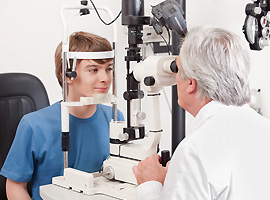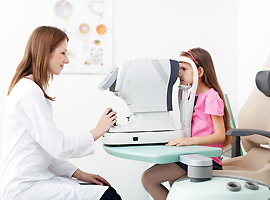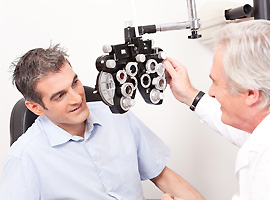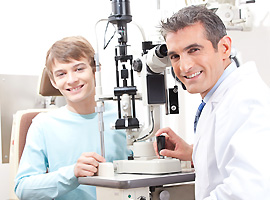services overview

VISION INSURANCE
We are a provider for most vision plans and usually you will have a minimal exam and material copay. The allowance for the materials depends on the plan.

FRAMES AND CONTACT LENSES
We offer a large collection of designer, affordable frames. Dr. Sabripour also fits a complete selection of soft and hard contact lenses.

WILL MEDICAL INSURANCE PAY FOR MY EXAM?
Medical and Medicare insurance does not include refractions and contact lens fittings, therefore you will pay for your glasses and contact lens prescription out of pocket if you use your medical insurance.
main services
At Clear Vision Center, you will receive one of the most comprehensive eye exams possible so we can quickly detect signs of diseases or abnormalities early on, while they're still easy to treat. In addition to assessing nearsightedness, farsightedness, astigmatism and other refractive abnormalities, we'll perform a thorough check for sight-threatening problems like glaucoma, cataracts and diabetic retinopathy, to name a few.
We use some of the most technologically advanced diagnostic equipment available to make your exam fast, easy and comfortable. We are also specialists in the diagnosis and management of computer-related eyestrain and will help you navigate and select the most effective devices to help you resume your daily activities. Rest assure, we always explain every step of our testing process clearly, so you have a complete understanding of your current eye health. This kind of regular preventive care is critical for preserving clear, healthy vision throughout your life.
-
Eye Health and Vision Exam
Examinations include refraction, eye movement and coordination, depth perception, color vision, pupillary testing, peripheral and central vision screening, glaucoma and cataract check, dry eye and allergy assessment, macular degeneration evaluation, and full dilated health evaluation.
-
Contact Lens Evaluation and Fitting
Dr Bita fits soft, bifocal, gas permeable, and specialty contact lenses for various conditions such as keratoconus or astigmatism by verifying your prescription then evaluating your eye health, size, shape, and curvature.
-
Latest Technological Equipment and Care
Our practice is offering the latest Optometry methodologies, using the most modern equipment. Dr. Bita and her staff tailor their practice with continuous education and equipment upgrades so you can recieve the highest quality of optometric services.
-
Post-Operation Care
Post-operative care is equally important and includes several post-operative examinations for up to one-year after your initial surgery. During these examinations, we monitor your progress to determine if there is a need to further sharpen your vision. Any vision enhancements deemed medically necessary by Dr. Sabripour, and which are visually beneficial with no significant risks, are included during post-operative care.
-
Refraction Assessment
A refraction assessment helps your doctor determine a corrective lens prescription that will give you the sharpest vision. For patients with certain types of insurance, refraction can be followed by on-site dispensing of glasses. Those choosing contact lenses will be fitted accurately and will obtain appropriate education in the safe use of contacts and in general eye care.
What to expect from an eye exam
An eye exam is one of the best ways to protect your vision because it can detect eye problems at their earliest stages, when they're most treatable. Regular eye exams give your eye care professional a chance to help you correct or adapt to vision changes. We can give you expert tips on reducing eyestrain and caring for your eyes.
-
Medical History
The eye exam usually begins with Dr. Sabripour asking about your medical history and any vision problems you might be experiencing.
-
Eye Check
Next the doctor makes a complete check using light to ensure the exterior and interior parts of your eyes are functioning correctly.
-
Visual Acuity
Finally, the doctor measures your visual acuity, assesses your need for glasses and/or contact lenses.
How should you prepare for an eye exam?
Bring in old glasses, sunglasses, old prescriptions of glasses and/or contacts. Be prepared to be dilated; dilation will cause your vision to be sensitive to light and it is always best to come with a designated driver. If you're visiting a new eye doctor or if you're having your first eye exam, expect questions about your vision history. Your answers to these questions help your eye doctor understand your risk of eye disease and vision problems. Be prepared to give specific information, including:
-
Are you having any eye problems now?
Do you wear glasses or contacts now? If so, are you satisfied with them?
-
Have you had any eye problems in the past?
Are you taking any medications?
-
Do you have any allergies to medications, food or other substances?
Has anyone in your family had eye problems, such as cataracts or glaucoma?
